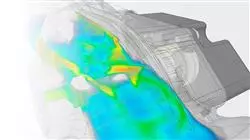University certificate
The world's largest faculty of engineering”
Introduction to the Program
With this complete Postgraduate certificate you will be able to acquire skills in Multiphase Flow Simulation, which will not only allow you to highlight your profile as a key player in Industry 4.0, but also broaden your horizons in research and technological development"

Multiphase Flow Simulation is a discipline in constant evolution. The numerical models and algorithms used in this branch of engineering allow understanding the behavior of fluids in various situations. For example, it is of fundamental importance in many industrial areas, such as food, pharmaceuticals, protocols or oil and gas. Its proper implementation translates into greater efficiency and safety in production processes. In addition, the incorporation of advanced technologies, such as Machine Learning, offers more opportunities to optimize existing models and obtain accurate results, improving decision making and reducing manufacturing costs.
Due to the high demand for specialized profiles in this area, the Multiphase Flow Simulation Diploma is an essential training for engineers seeking to keep up to date, and to be able to implement the correct techniques to meet the challenges of today's market. Its contents offer a practical and updated approach, and are developed in a 100% online format, which allows students to access it from anywhere in the world. In addition, the curriculum uses the innovative Relearning methodology, which fosters effective learning and autonomous problem solving.
In short, this Postgraduate certificate will help students to acquire cutting-edge competencies, with the aim of broadening their knowledge, in addition to providing a competitive advantage to their profile. In this way, the engineering professional who performs it will achieve skills that will streamline industrial logistics, representing a key piece for business growth.
The demand for engineers with skills in Multiphase Flow Simulation is increasing. According to the U.S. Department of Labor, employment of petroleum and chemical engineers is expected to continue to expand"
This Postgraduate certificate in Multiphase Flow Simulation contains the most complete and up-to-date program on the market. The most important features include:
- The development of case studies presented by experts in Textile Engineering
- The graphic, schematic, and practical contents with which they are created, provide practical information on the disciplines that are essential for professional practice
- Practical exercises where self-assessment can be used to improve learning
- Its special emphasis on innovative methodologies
- Theoretical lessons, questions to the expert, debate forums on controversial topics, and individual reflection assignments
- Content that is accessible from any fixed or portable device with an Internet connection
Get trained in Multiphase Flow Simulation and help minimize greenhouse gas emissions in industry. With the knowledge you will acquire in this Diploma, you will propel your career towards change"
The program’s teaching staff includes professionals from the sector who contribute their work experience to this educational program, as well as renowned specialists from leading societies and prestigious universities.
Its multimedia content, developed with the latest educational technology, will provide the professional with situated and contextual learning, i.e., a simulated environment that will provide an immersive education programmed to learn in real situations.
The design of this program focuses on Problem-Based Learning, by means of which the professional must try to solve the different practical situations that arise throughout the academic program. This will be done with the help of an innovative system of interactive videos made by renowned experts.
Expand your knowledge in complex fluid transport simulation and help reduce project design costs by up to 30%"

Specialize in optimizing industrial processes of various kinds, from food, pharmaceutical, or petrochemical, and open your job opportunities to the best companies in the sector"
Syllabus
A team of experts in fluid engineering has designed the curriculum for this program, which covers 150 hours of theoretical, practical and complementary content presented in various audiovisual formats. In addition, thanks to TECH's innovative Relearning methodology, students will be able to enter Multiphase Flow Simulation in a natural and gradual way. This program is presented in a fully online and flexible format, which allows students to access the most advanced tools from any device with an internet connection and have access to the virtual campus 24 hours a day.

Learn to identify potential risks and design contingency plans to prevent accidents and minimize environmental impact"
Module 1. Multiphase flow
1.1. Flow regimes
1.1.1. Continuous phase
1.1.2. Discrete phase
1.1.3. Discrete phase populations
1.2. Continuous phases
1.2.1. Properties of the liquid-gas interface
1.2.2. Each phase a domain
1.2.3. Phase resolution independently.
1.2.4. Coupled solution
1.2.5. Fluid fraction as a descriptive phase scalar
1.2.6. Reconstruction of the gas-liquid interface
1.3. Marine simulation
1.3.1. Wave regimes. Wave height vs. depth
1.3.2. Input boundary condition. Wave simulation
1.3.3. Non-reflective output boundary condition. Numerical beach
1.3.4. Lateral boundary conditions. Lateral wind and drift
1.4. Surface Tension
1.4.1. Physical Phenomenon of the Surface Tension
1.4.2. Modeling
1.4.3. Interaction with surfaces. Angle of wetting
1.5. Phase shift
1.5.1. Source and sink terms associated with phase change
1.5.2. Evaporation models
1.5.3. Condensation and precipitation models. Nucleation of droplets
1.5.4. Cavitation
1.6. Discrete phase: particles, droplets and bubbles
1.6.1. Resistance strength
1.6.2. The buoyancy force
1.6.3. Inertia
1.6.4. Brownian motion and turbulence effects
1.6.5. Other forces
1.7. Interaction with the surrounding fluid
1.7.1. Generation from continuous phase
1.7.2. Aerodynamic drag
1.7.3. Interaction with other entities, coalescence and rupture.
1.7.4. Boundary Conditions
1.8. Statistical description of particle populations. Packages
1.8.1. Transportation of stocks
1.8.2. Stock boundary conditions
1.8.3. Stock interactions
1.8.4. Extending the discrete phase to populations
1.9. Water film
1.9.1. Water Sheet Hypothesis
1.9.2. Equations and modeling
1.9.3. Source term from particles
1.10. Example of an application with OpenFOAM
1.10.1. Description of an industrial problem
1.10.2. Setup and simulation
1.10.3. Visualization and interpretation of results

Thanks to this Postgraduate certificate, you will become a valuable expert in this sought-after branch of engineering and will be able to help predict the behavior of complex fluids in different scenarios or operating conditions"
Postgraduate Certificate in Multiphase Flow Simulation
Multiphase flow simulation is an essential tool in solving complex problems in the oil and gas industry. This university course provides the student with the fundamental knowledge in modeling and simulation of fluid flow in porous media and complex oil and gas production systems. At TECH Global University we offer a practical and applied approach to learning advanced multiphase flow simulation techniques. Throughout the course, students will acquire skills in simulation and prediction of flow dynamics in porous media and production systems, and process optimization. This program is designed for professionals working in the oil and gas industry, as well as for undergraduate students who wish to expand their knowledge in the field.
The program is designed for professionals working in the oil and gas industry, as well as for undergraduates who wish to expand their knowledge in the field.
In the Postgraduate Certificate in Multiphase Flow Simulation, students will learn how to model and simulate complex fluid flow processes in porous systems, which are of great importance in the oil and gas industry. The course focuses on understanding the fundamental principles of multiphase flow simulation and its practical application in real problems. In addition, students will acquire skills in the use of simulation software, including modeling and simulation of flow in porous media, simulation of oil and gas production processes, and process optimization. This course is designed to meet the needs of the industry by providing students with practical and applicable skills to address the challenges of multiphase flow simulation in the oil and gas industry.







